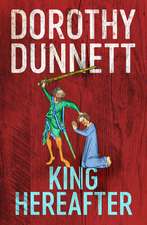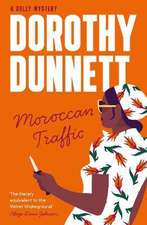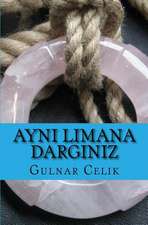Niccolo Rising: The House of Niccolo 1: House of Niccolo, cartea 1
Autor Dorothy Dunnetten Limba Engleză Paperback – 2 noi 1988
Niccolo Risingis Book One in The House of Niccolo series.
-----------------------------
'It began with sea, and September sunlight, and three young men lying stripped to their doublets in the Duke of Burgundy's bath . . .'
Meet Caes - Nicholas vander Poele - an eighteen-year-old orphan and dyer apprentice's working for the widow Marian de Charetty in Bruges. After fetching up in jail for accidentally sinking a lighter and breaking the leg of a nobleman, his young life seems over before it is even begun.
However, fate and the fifteenth century have great expectations for Nicholas and he soon finds himself leading the Charetty company into adventures and intrigues both mercantile and military, even as enemies plot their downfall.
Through cunning, bravery, wit and an unexpected wisdom, Nicholas begins to lay the foundations for the House of Niccolo . . .
'As brilliant and interesting as Lymond. A generous feast'Daily Telegraph
'A series that will give us our fill of high Renaissance adventure and espionage'Guardian
| Toate formatele și edițiile | Preț | Express |
|---|---|---|
| Paperback (2) | 72.27 lei 24-35 zile | +30.10 lei 4-10 zile |
| Penguin Books – 2 noi 1988 | 72.27 lei 24-35 zile | +30.10 lei 4-10 zile |
| Vintage Books USA – 28 feb 1999 | 119.55 lei 3-5 săpt. |
Din seria House of Niccolo
- 31%
 Preț: 58.76 lei
Preț: 58.76 lei -
 Preț: 115.52 lei
Preț: 115.52 lei -
 Preț: 121.63 lei
Preț: 121.63 lei -
 Preț: 121.63 lei
Preț: 121.63 lei -
 Preț: 115.52 lei
Preț: 115.52 lei -
 Preț: 115.52 lei
Preț: 115.52 lei -
 Preț: 121.63 lei
Preț: 121.63 lei
Preț: 72.27 lei
Preț vechi: 84.29 lei
-14% Nou
Puncte Express: 108
Preț estimativ în valută:
13.83€ • 15.03$ • 11.63£
13.83€ • 15.03$ • 11.63£
Carte disponibilă
Livrare economică 04-15 aprilie
Livrare express 15-21 martie pentru 40.09 lei
Preluare comenzi: 021 569.72.76
Specificații
ISBN-13: 9780140113914
ISBN-10: 0140113916
Pagini: 592
Ilustrații: maps
Dimensiuni: 129 x 198 x 35 mm
Greutate: 0.44 kg
Editura: Penguin Books
Colecția Penguin
Seria House of Niccolo
Locul publicării:London, United Kingdom
ISBN-10: 0140113916
Pagini: 592
Ilustrații: maps
Dimensiuni: 129 x 198 x 35 mm
Greutate: 0.44 kg
Editura: Penguin Books
Colecția Penguin
Seria House of Niccolo
Locul publicării:London, United Kingdom
Notă biografică
Frequently
described
as
the
finest
historical
fiction
writer
of
her
time,Dorothy
Dunnettearned
worldwide
acclaim
for
her
blend
of
scholarship
and
imagination.
She
is
best
known
for
her
two
superb
series
of
historical
fiction
-The
Lymond
ChroniclesandThe
House
of
Niccolo-
set
in
the
fifteenth
and
sixteenth
centuries
and
ranging
across
Europe
and
the
Mediterranean,
and
forKing
Hereafter,
the
eleventh-century
story
of
Earl
Thorfinn
of
Orkney
whom
Dorothy
believed
was
also
King
Macbeth.
In
1992,
Dorothy
Dunnett
was
awarded
the
OBE
for
her
services
to
literature,
and
in
2014
Dunnett's
most
enduring
hero,
Francis
Crawford
of
Lymond,
was
voted
Scotland's
favourite
literary
character
-
beating
the
likes
of
Sherlock
Holmes,
Harry
Potter
and
Ivanhoe.
Dunnett
died
9
November
2001,
having
sold
half
a
million
copies
internationally.
Recenzii
Praise
for
Dorothy
Dunnett
A storyteller who could teach Scheherazade a thing or two about pace,suspense and imaginative invention
Marvellous, breathtaking
Amasterpieceof historical fiction
One of thegreatest tale-spinnerssince Dumas
Lashings ofexcitement, colour and subtlety
Vivid, engaging, densely plotted- are almost certainly destined to be counted among the classics of popular fiction
A storyteller who could teach Scheherazade a thing or two about pace,suspense and imaginative invention
Marvellous, breathtaking
Amasterpieceof historical fiction
One of thegreatest tale-spinnerssince Dumas
Lashings ofexcitement, colour and subtlety
Vivid, engaging, densely plotted- are almost certainly destined to be counted among the classics of popular fiction
Extras
Chapter 1
From Venice to Cathay, from Seville to the Gold Coast of Africa, men anchored their ships and opened their ledgers and weighed one thing against another as if nothing would ever change. Or as if there existed no sort of fool, of either sex, who might one day treat trade (trade!) as an amusement.
It began mildly enough, the awkward chain of events that was to upset the bankers so much. It began with sea, and September sunlight, and three young men lying stripped to their doublets in the Duke of Burgundy's bath.
Of the three, Claes and Felix were watching the canal bank for girls. Julius, his instincts blunted by an extra decade, was content to sink back, agreeably fortified, and forget he was anyone's tutor. A good astrologer would have told him to get out at once.
The sun warmed the bath, and the water bore it along on the last stage of its meandering journey. From the leadfounder's in England it had crossed the narrow sea to the Low Countries in a serviceable wind-battered caravel. It had been unloaded with some trouble in the crowded harbour at Sluys, and strapped with some trouble athwart a canal boat with a scratch crew of oarsmen.
And now, here it was. Lumped with cherubs: a bath for the noble Philip, Duke of Burgundy, Count of Flanders, Margrave of the Holy Roman Empire and all the rest of his high-yielding honours. A communal bathing-basin now on its way to the Duke's occasional residence in the merchant city of Bruges. And working their passage inside it, Julius, Felix and Claes.
For the moment, there was nothing to do. In the peace, a wave of philosophy overcame Julius. "What," he said, "is happiness?" He opened his eyes.
"A new hound," said Felix, who was seventeen. His crossbow lay on the points of his pelvis and his ratlike nose was red with the sun. "The kind with big ears."
Julius curled a lip, without malice. So much for Felix. He turned his gaze towards Claes, who was eighteen and built like an oak tree with dimples.
"A new girl," offered Claes. He jerked open the wine flask, gripping the neck like the hock of a stallion. "The kind with . . ."
"That's enough," Julius said. Philosophy was wasted on both of them. Everything was wasted on Claes. Julius was sometimes glad that civilization had reached the advanced stage it had, so that it could stand up to Claes. The Greeks would have gone back to tents.
Claes looked at him, pained. He said, "I've only had-" Beside him, young Felix was grinning.
Julius said, "Drink! Drink! I said that's enough about girls. Forget I said anything."
"All right," said Claes, surprised. He drank. He inhaled. His nostrils were indigo blue. He said, "This is nice."
Julius refrained from agreeing. A dyeshop apprentice would find any change nice. Felix (his charge, his employer's son, his daily burden) had enjoyed the day's rabbiting, but didn't deserve to. Only he, Julius, had left his cares in the dyeshop and had a right, for one day, to indulge himself.
The canal banks glided past. The lightermen bickered companionably and dropped into snatches of song as they paddled. The sunwarmed cherubim lodged three indolent heads, cheek by jowl round the bath-rim. Julius found the wine flask in his hand, and eclipsed the whole sun with its bottom. A conscientious youth, yet with a troublesome lightness of character. So they had assessed him, while he was earning his scroll at Bologna.
God take all law schools and dispose of them. This is Flanders, not Italy. You volunteer to unload a bath from a ship. You accept a lift in the bath back to your place of residence and employment. You close your eyes the better to ponder. Where is the lightness in that? Julius, notary to the Charetty family, closed his eyes. Almost at once, so it seemed, he endured a nasty blow to his ribs. Half-awake, he flung out a fist in return. He hit something.
"Hey!" said Felix and, his face flushed, made to kick him again.
Julius rolled over, escaping the foot. The sound of rushing water told him why Felix had wakened him. They were approaching the lock.
Felix's voice was continuing, monumentally resonant because of the bath. "You've knocked my hat off," boomed Felix. "You've broken the feather."
The lightermen, steering up to the lock, glanced round appreciatively, and so did Claes, who had got up to help them. The truth was, it was hard to hit Felix and avoid hitting his headgear. This one had a peak and a long pointed brim like a paper boat. Its osprey feather curled, broken-backed, on the rabbit-bag. Where the hat had been, Felix's brown hair was sweaty and flat, and his curls had sagged into corkscrews. He looked furious.
Claes said, "You said you were tired of the feather. It's time for the beer, Meester Julius."
Claes had been with the Charetty since he was ten, and being a family by-blow, he got to speak that way to Felix. Through the years Claes had become not only an apprentice but a kind of servant-companion to the Charetty heir. Felix tried to batter Claes regularly but mostly put up with him. Felix's mother, thankful for peace, let Claes off his dyeshop duties whenever Felix demanded it. Julius, equally thankful, hoped that Claes' spasmodic apprenticeship would last long enough to see Felix into maturity, if not old age and burial.
Julius, an easy-going sort of man, had nothing much against jonk-heere Felix. He could control him. Claes, of course, had no writ to control anyone, which was why he got beaten so freely. It made him very helpful. Julius watched Claes give a last shove with his oar, put it down, and then walk round the end of the boat and hand Felix his hat. All anyone remembered of Claes were his size and the dents in his cheeks and his helpfulness. And that nothing female under twenty was safe from his endeavours.
Julius could see his mouth opening and shutting outside the bath, and hear Felix booming back from within. Julius didn't join the discussion, which was on the usual subject. Of course, he liked watching a good-looking woman. He had his share of vanity. He knew his sort of looks drew attention. He had had to extract himself more than once from some developing situation with a client's young wife. It was not, either, that he contemplated taking Holy Orders, or not up to the present. But if a good chance came along, a man ought to be ready. He was moderate. He didn't raven, like Claes; or yearn like poor Felix when brought to sail the canalised river between Sluys and Damme, passing three miles of ankles and a handful of knees, if you were lucky.
Accessible ankles, what's more. You didn't find grand ladies with steeple headdresses and shaved brows and pearls on their slippers among the quays and sheds and warehouses and pens and tie-posts of the two ports of Bruges. You got pertly laundered white caps and slyly hitched work-gowns: enough of them to please even Claes, Julius thought. The liveliest girls called down to one youth or the other. Men sang out too, and boys ran alongside, keeping up with the rowers. One tossed a pebble into the bath, and it chimed like the tongue of a church bell. The tongue of the thrower soon drowned it, as his father hurriedly thrashed him. Even from Brussels, or Dijon, or Lille, Duke Philip could hear things.
Claes stayed on his feet beside Felix. Felix was signalling masterfully with his hat, from which Claes had adopted the feather. Three feet long, it waved from his thatch like a fishing line. On the other side of the boat, Julius helped throw up the ropes at the sealock, and heaved up the statutory can of Bruges beer to the lock-keeper.
The man looked at him twice before naming him. Without the gown he wasn't Meester Julius the notary; he was just another young pest in his twenties. In his more sober moments, Julius was aware that exploits such as these were unseemly. In his less sober moments, he refused to be bothered. The lock-keeper had no trouble recognising Felix or Claes. Everyone in Bruges and Louvain knew the Charetty heir and his slavish attendant.
There were no other craft in the lock: another mark of the power of the Duke. The lighter entered, and behind it the tidal gates waded creaking together. The lock-keeper, stowing his beer, walked off to open the sluices. Perched high on the water, Julius looked ahead, beyond the shut wooden gates, to where the canal ran straight over the marshlands which led to the far spires of Bruges. Immediately outside the sluice another barge, seaward bound, lay double-moored to the bank, waiting for them to emerge.
It, too, lay low in the water. It, too, bore only one item of cargo: a single thickly wrapped object some fifteen feet long which did not, like the Princenhof bath, project beyond either gunwale, but lay snugly within the barge well, hardly moved by the swell of the water.
Above it, in a cleared and cordoned space on the bank, stood a group of undoubtedly very grand persons with an authentic steeple headdress drifting among them. From the superior height of the lock, Julius gazed upon them. So did Felix and Claes and the lightermen.
There were banners. There were soldiers. There was a group of well-turned-out local churchmen escorting the figure of a medium-sized, broad-shouldered bishop with precious stones winking all over him. Julius knew who he was. He owned the Scots ship St Salvator, the largest vessel they had seen back at Sluys. It had already unloaded and had been taking on cargo for Scotland.
Felix said, "That's Bishop Kennedy, the King's cousin, come to winter in Bruges. That's the party he brought with him from Scotland: they must have been staying in Damme since they landed. What are they waiting for?"
"Us," said Claes happily. His feather waved slowly.
"The lighter," said Felix. Occasionally, the future burgess surfaced in Felix. "What's that thing in the lighter? Cargo for the St Salvator maybe?"
Occasionally, Felix was right. "Important cargo," said Julius. "Look. It's got Duke Philip's own seals all over it."
Hence, of course, the escorting soldiers and the other overdressed dignitaries. There was the ducal flag, with the Duke's deputy controller in its shadow. There was the banner of Bruges, with the Communal Burgomaster and a couple of ?chevins under it. Also the cleverest agent in Bruges and one of the wealthiest: Anselm Adorne in a furred robe, his long poet's face wreathed by the scarves of his hat. His wife was with him, her wired headdress sensibly hooded, apparently brought in to shepherd the only female in the Bishop's small party. The female, turning, proved to be a fine-looking girl in a temper.
Felix said, "That's Katelina van Borselen. You know. She's nineteen. They sent her to Scotland to marry. She must have come back with the Bishop. And I may be blind, but I don't see a husband."
Married or unmarried, the girl called Katelina was wearing the steeple headdress. The hennin had caught the wind and was furling and unfurling its veil like a flagpole so that she had to hold it with both tight-cuffed hands. She wore no ring, but there were two possible suitors beside her, presumably off the same ship. One was an elegant older man with a beard, wearing a draped hat and gown Julius would swear came from Florence. The other was some silly gallant.
A good astrologer would, at that moment, have taken Julius by the arm. A good astrologer would have said, Do not look at the Bishop. Do not speak to the lady. Keep away from Anselm Adorne and the Florentine with the beard. And above all, my friend, leave the boat now, before you make the acquaintance of the man you call some silly gallant.
No one took Julius by the arm. Fate, which had a better idea, let him conquer his pang of jealousy and recognise that before him on the quay was a fair-skinned man of quite striking good looks, wearing a silken tunic as brief as a shirt-tail. Between cap and ear, the fellow's hair was bright as church gold. Between high brow and cleft chin, his expression was one of impatience, mixed with ineffable scorn.
From the badge of his henchman he was of consequence. The henchman held, with some care, the leash of a muscular hound with an identical crest on its back-cloth. Hand on sword-hilt, his master was posed like a painting, one shapely limb flexed in its blue hose, the other stalwartly straight in its white. His gaze, idly scanning the onlookers, discovered the stare of a serving-girl. The nobleman lifted his brows and the girl, hugging her pail, coloured brightly.
Claes, transfixed beside Julius, allowed his feather to wander. Julius sneezed without ceasing to gaze at the paragon who, in turn, had caught sight of the bathing basin. It seemed to amuse him. Snapping his fingers, he acquired the leash of his hound and began to stroll up to the lock, throwing a remark, as he went, to the lady. He looked as if he might snap his fingers for her as well, Julius thought, but he didn't. And although she looked after him, she didn't follow.
The well-dressed magnifico came closer. He was not as young as you might think, at a distance. Thirty-three, thirty-four. His blue taffeta was French cut, and so was the one-shouldered cloak and the tilted plate of a hat with its ruby. In his two years at Bruges, Julius had never seen him before. Felix had. Felix, his fingers plucking his own atrocious pinked velvet, spoke in a voice of unwilling awe. "That's Simon," said Felix. "Heir to an uncle in Kilmirren, Scotland. They say he's never had a refusal. The rich ones think he'll marry them, and the poor ones don't care."
"What?" said Julius. Claes said nothing. His feather had come to a halt.
Felix said, "The rich . . ."
"Never mind," Julius said. Simon of Kilmirren came to rest on the bank just beside them. The underwater sluice gates had opened. The water they were floating on began to crease a little and swirl, and a line of wet appeared on the lock wall. The lock-keeper came up.
The man called Simon said, "My poor man, you take your time, you Flemish clods, don't you? I saw some beer."
His Flemish was very good. The lock-keeper had no trouble accepting insults from gentlemen, especially if he saw a profit in it. He said, "It's a custom, my lord. Beer during the passage to Bruges, and the dues paid on the way back. My lord is going to Bruges?"
From Venice to Cathay, from Seville to the Gold Coast of Africa, men anchored their ships and opened their ledgers and weighed one thing against another as if nothing would ever change. Or as if there existed no sort of fool, of either sex, who might one day treat trade (trade!) as an amusement.
It began mildly enough, the awkward chain of events that was to upset the bankers so much. It began with sea, and September sunlight, and three young men lying stripped to their doublets in the Duke of Burgundy's bath.
Of the three, Claes and Felix were watching the canal bank for girls. Julius, his instincts blunted by an extra decade, was content to sink back, agreeably fortified, and forget he was anyone's tutor. A good astrologer would have told him to get out at once.
The sun warmed the bath, and the water bore it along on the last stage of its meandering journey. From the leadfounder's in England it had crossed the narrow sea to the Low Countries in a serviceable wind-battered caravel. It had been unloaded with some trouble in the crowded harbour at Sluys, and strapped with some trouble athwart a canal boat with a scratch crew of oarsmen.
And now, here it was. Lumped with cherubs: a bath for the noble Philip, Duke of Burgundy, Count of Flanders, Margrave of the Holy Roman Empire and all the rest of his high-yielding honours. A communal bathing-basin now on its way to the Duke's occasional residence in the merchant city of Bruges. And working their passage inside it, Julius, Felix and Claes.
For the moment, there was nothing to do. In the peace, a wave of philosophy overcame Julius. "What," he said, "is happiness?" He opened his eyes.
"A new hound," said Felix, who was seventeen. His crossbow lay on the points of his pelvis and his ratlike nose was red with the sun. "The kind with big ears."
Julius curled a lip, without malice. So much for Felix. He turned his gaze towards Claes, who was eighteen and built like an oak tree with dimples.
"A new girl," offered Claes. He jerked open the wine flask, gripping the neck like the hock of a stallion. "The kind with . . ."
"That's enough," Julius said. Philosophy was wasted on both of them. Everything was wasted on Claes. Julius was sometimes glad that civilization had reached the advanced stage it had, so that it could stand up to Claes. The Greeks would have gone back to tents.
Claes looked at him, pained. He said, "I've only had-" Beside him, young Felix was grinning.
Julius said, "Drink! Drink! I said that's enough about girls. Forget I said anything."
"All right," said Claes, surprised. He drank. He inhaled. His nostrils were indigo blue. He said, "This is nice."
Julius refrained from agreeing. A dyeshop apprentice would find any change nice. Felix (his charge, his employer's son, his daily burden) had enjoyed the day's rabbiting, but didn't deserve to. Only he, Julius, had left his cares in the dyeshop and had a right, for one day, to indulge himself.
The canal banks glided past. The lightermen bickered companionably and dropped into snatches of song as they paddled. The sunwarmed cherubim lodged three indolent heads, cheek by jowl round the bath-rim. Julius found the wine flask in his hand, and eclipsed the whole sun with its bottom. A conscientious youth, yet with a troublesome lightness of character. So they had assessed him, while he was earning his scroll at Bologna.
God take all law schools and dispose of them. This is Flanders, not Italy. You volunteer to unload a bath from a ship. You accept a lift in the bath back to your place of residence and employment. You close your eyes the better to ponder. Where is the lightness in that? Julius, notary to the Charetty family, closed his eyes. Almost at once, so it seemed, he endured a nasty blow to his ribs. Half-awake, he flung out a fist in return. He hit something.
"Hey!" said Felix and, his face flushed, made to kick him again.
Julius rolled over, escaping the foot. The sound of rushing water told him why Felix had wakened him. They were approaching the lock.
Felix's voice was continuing, monumentally resonant because of the bath. "You've knocked my hat off," boomed Felix. "You've broken the feather."
The lightermen, steering up to the lock, glanced round appreciatively, and so did Claes, who had got up to help them. The truth was, it was hard to hit Felix and avoid hitting his headgear. This one had a peak and a long pointed brim like a paper boat. Its osprey feather curled, broken-backed, on the rabbit-bag. Where the hat had been, Felix's brown hair was sweaty and flat, and his curls had sagged into corkscrews. He looked furious.
Claes said, "You said you were tired of the feather. It's time for the beer, Meester Julius."
Claes had been with the Charetty since he was ten, and being a family by-blow, he got to speak that way to Felix. Through the years Claes had become not only an apprentice but a kind of servant-companion to the Charetty heir. Felix tried to batter Claes regularly but mostly put up with him. Felix's mother, thankful for peace, let Claes off his dyeshop duties whenever Felix demanded it. Julius, equally thankful, hoped that Claes' spasmodic apprenticeship would last long enough to see Felix into maturity, if not old age and burial.
Julius, an easy-going sort of man, had nothing much against jonk-heere Felix. He could control him. Claes, of course, had no writ to control anyone, which was why he got beaten so freely. It made him very helpful. Julius watched Claes give a last shove with his oar, put it down, and then walk round the end of the boat and hand Felix his hat. All anyone remembered of Claes were his size and the dents in his cheeks and his helpfulness. And that nothing female under twenty was safe from his endeavours.
Julius could see his mouth opening and shutting outside the bath, and hear Felix booming back from within. Julius didn't join the discussion, which was on the usual subject. Of course, he liked watching a good-looking woman. He had his share of vanity. He knew his sort of looks drew attention. He had had to extract himself more than once from some developing situation with a client's young wife. It was not, either, that he contemplated taking Holy Orders, or not up to the present. But if a good chance came along, a man ought to be ready. He was moderate. He didn't raven, like Claes; or yearn like poor Felix when brought to sail the canalised river between Sluys and Damme, passing three miles of ankles and a handful of knees, if you were lucky.
Accessible ankles, what's more. You didn't find grand ladies with steeple headdresses and shaved brows and pearls on their slippers among the quays and sheds and warehouses and pens and tie-posts of the two ports of Bruges. You got pertly laundered white caps and slyly hitched work-gowns: enough of them to please even Claes, Julius thought. The liveliest girls called down to one youth or the other. Men sang out too, and boys ran alongside, keeping up with the rowers. One tossed a pebble into the bath, and it chimed like the tongue of a church bell. The tongue of the thrower soon drowned it, as his father hurriedly thrashed him. Even from Brussels, or Dijon, or Lille, Duke Philip could hear things.
Claes stayed on his feet beside Felix. Felix was signalling masterfully with his hat, from which Claes had adopted the feather. Three feet long, it waved from his thatch like a fishing line. On the other side of the boat, Julius helped throw up the ropes at the sealock, and heaved up the statutory can of Bruges beer to the lock-keeper.
The man looked at him twice before naming him. Without the gown he wasn't Meester Julius the notary; he was just another young pest in his twenties. In his more sober moments, Julius was aware that exploits such as these were unseemly. In his less sober moments, he refused to be bothered. The lock-keeper had no trouble recognising Felix or Claes. Everyone in Bruges and Louvain knew the Charetty heir and his slavish attendant.
There were no other craft in the lock: another mark of the power of the Duke. The lighter entered, and behind it the tidal gates waded creaking together. The lock-keeper, stowing his beer, walked off to open the sluices. Perched high on the water, Julius looked ahead, beyond the shut wooden gates, to where the canal ran straight over the marshlands which led to the far spires of Bruges. Immediately outside the sluice another barge, seaward bound, lay double-moored to the bank, waiting for them to emerge.
It, too, lay low in the water. It, too, bore only one item of cargo: a single thickly wrapped object some fifteen feet long which did not, like the Princenhof bath, project beyond either gunwale, but lay snugly within the barge well, hardly moved by the swell of the water.
Above it, in a cleared and cordoned space on the bank, stood a group of undoubtedly very grand persons with an authentic steeple headdress drifting among them. From the superior height of the lock, Julius gazed upon them. So did Felix and Claes and the lightermen.
There were banners. There were soldiers. There was a group of well-turned-out local churchmen escorting the figure of a medium-sized, broad-shouldered bishop with precious stones winking all over him. Julius knew who he was. He owned the Scots ship St Salvator, the largest vessel they had seen back at Sluys. It had already unloaded and had been taking on cargo for Scotland.
Felix said, "That's Bishop Kennedy, the King's cousin, come to winter in Bruges. That's the party he brought with him from Scotland: they must have been staying in Damme since they landed. What are they waiting for?"
"Us," said Claes happily. His feather waved slowly.
"The lighter," said Felix. Occasionally, the future burgess surfaced in Felix. "What's that thing in the lighter? Cargo for the St Salvator maybe?"
Occasionally, Felix was right. "Important cargo," said Julius. "Look. It's got Duke Philip's own seals all over it."
Hence, of course, the escorting soldiers and the other overdressed dignitaries. There was the ducal flag, with the Duke's deputy controller in its shadow. There was the banner of Bruges, with the Communal Burgomaster and a couple of ?chevins under it. Also the cleverest agent in Bruges and one of the wealthiest: Anselm Adorne in a furred robe, his long poet's face wreathed by the scarves of his hat. His wife was with him, her wired headdress sensibly hooded, apparently brought in to shepherd the only female in the Bishop's small party. The female, turning, proved to be a fine-looking girl in a temper.
Felix said, "That's Katelina van Borselen. You know. She's nineteen. They sent her to Scotland to marry. She must have come back with the Bishop. And I may be blind, but I don't see a husband."
Married or unmarried, the girl called Katelina was wearing the steeple headdress. The hennin had caught the wind and was furling and unfurling its veil like a flagpole so that she had to hold it with both tight-cuffed hands. She wore no ring, but there were two possible suitors beside her, presumably off the same ship. One was an elegant older man with a beard, wearing a draped hat and gown Julius would swear came from Florence. The other was some silly gallant.
A good astrologer would, at that moment, have taken Julius by the arm. A good astrologer would have said, Do not look at the Bishop. Do not speak to the lady. Keep away from Anselm Adorne and the Florentine with the beard. And above all, my friend, leave the boat now, before you make the acquaintance of the man you call some silly gallant.
No one took Julius by the arm. Fate, which had a better idea, let him conquer his pang of jealousy and recognise that before him on the quay was a fair-skinned man of quite striking good looks, wearing a silken tunic as brief as a shirt-tail. Between cap and ear, the fellow's hair was bright as church gold. Between high brow and cleft chin, his expression was one of impatience, mixed with ineffable scorn.
From the badge of his henchman he was of consequence. The henchman held, with some care, the leash of a muscular hound with an identical crest on its back-cloth. Hand on sword-hilt, his master was posed like a painting, one shapely limb flexed in its blue hose, the other stalwartly straight in its white. His gaze, idly scanning the onlookers, discovered the stare of a serving-girl. The nobleman lifted his brows and the girl, hugging her pail, coloured brightly.
Claes, transfixed beside Julius, allowed his feather to wander. Julius sneezed without ceasing to gaze at the paragon who, in turn, had caught sight of the bathing basin. It seemed to amuse him. Snapping his fingers, he acquired the leash of his hound and began to stroll up to the lock, throwing a remark, as he went, to the lady. He looked as if he might snap his fingers for her as well, Julius thought, but he didn't. And although she looked after him, she didn't follow.
The well-dressed magnifico came closer. He was not as young as you might think, at a distance. Thirty-three, thirty-four. His blue taffeta was French cut, and so was the one-shouldered cloak and the tilted plate of a hat with its ruby. In his two years at Bruges, Julius had never seen him before. Felix had. Felix, his fingers plucking his own atrocious pinked velvet, spoke in a voice of unwilling awe. "That's Simon," said Felix. "Heir to an uncle in Kilmirren, Scotland. They say he's never had a refusal. The rich ones think he'll marry them, and the poor ones don't care."
"What?" said Julius. Claes said nothing. His feather had come to a halt.
Felix said, "The rich . . ."
"Never mind," Julius said. Simon of Kilmirren came to rest on the bank just beside them. The underwater sluice gates had opened. The water they were floating on began to crease a little and swirl, and a line of wet appeared on the lock wall. The lock-keeper came up.
The man called Simon said, "My poor man, you take your time, you Flemish clods, don't you? I saw some beer."
His Flemish was very good. The lock-keeper had no trouble accepting insults from gentlemen, especially if he saw a profit in it. He said, "It's a custom, my lord. Beer during the passage to Bruges, and the dues paid on the way back. My lord is going to Bruges?"
Descriere
Descriere de la o altă ediție sau format:
Street smart, and adept at the subtleties of diplomacy, the hero rises from wastrel to prodigy in a breathless adventure that wins him the hand of the most powerful woman in the city of Bruges.
Street smart, and adept at the subtleties of diplomacy, the hero rises from wastrel to prodigy in a breathless adventure that wins him the hand of the most powerful woman in the city of Bruges.




















